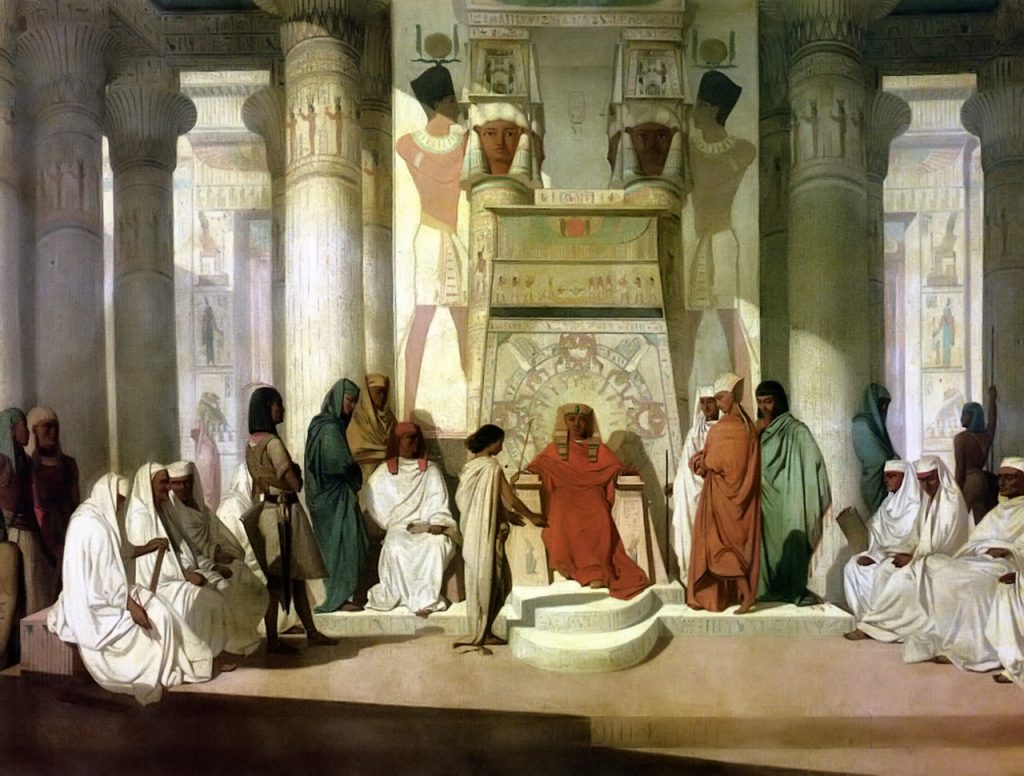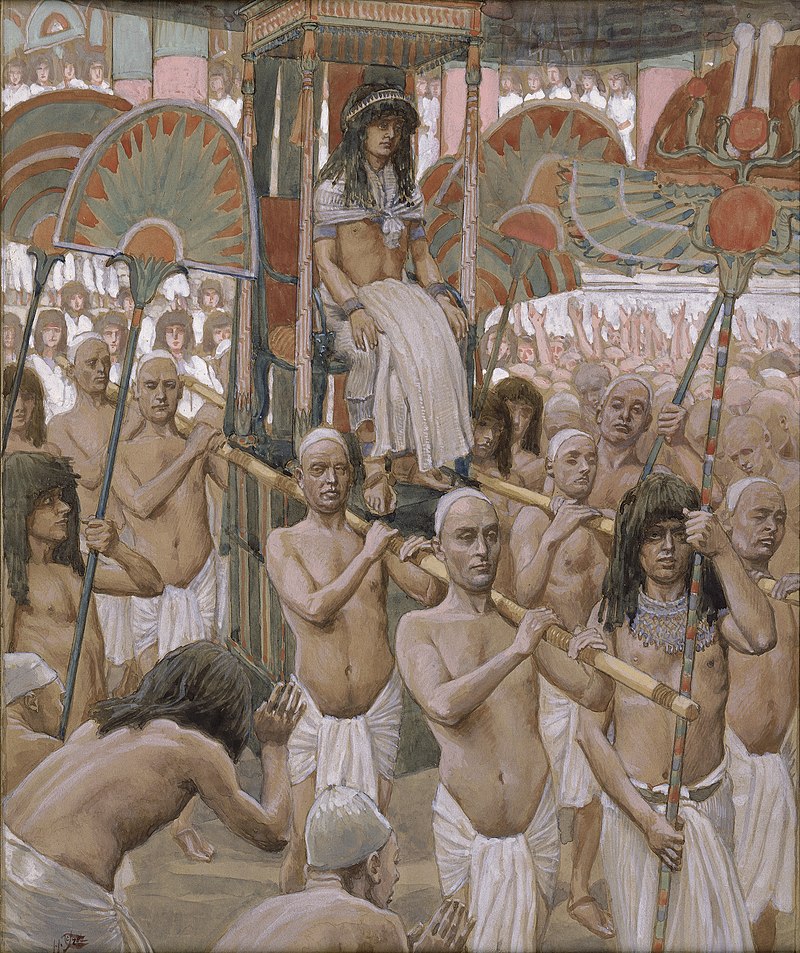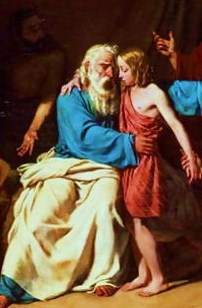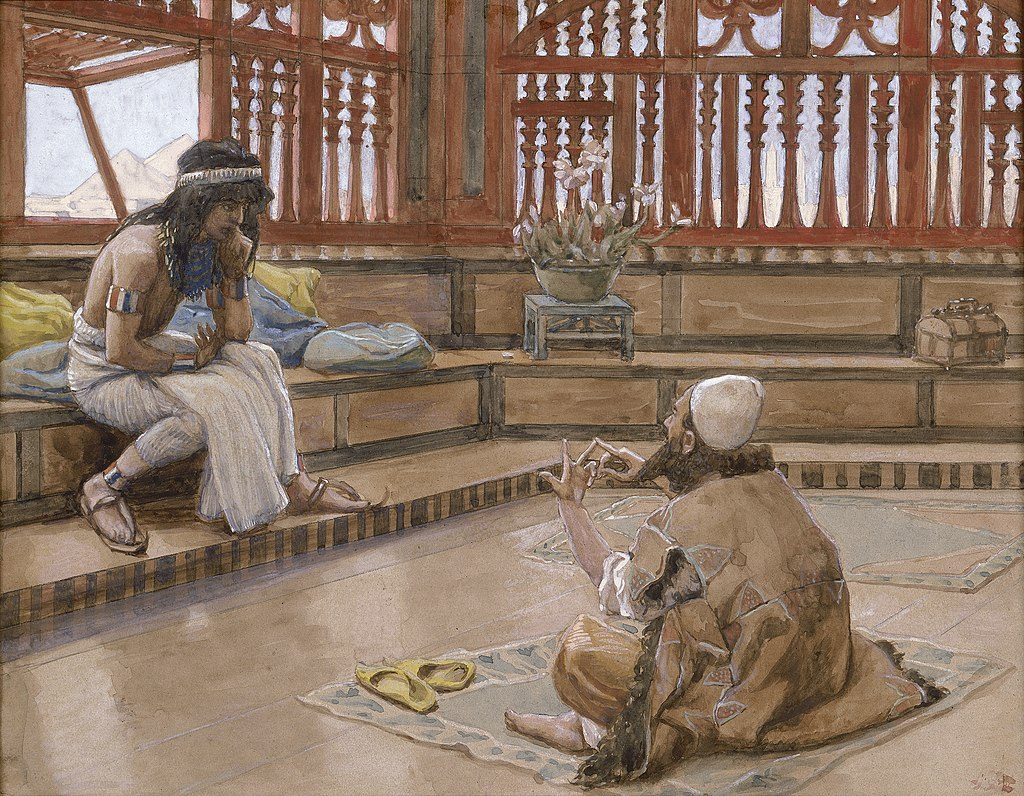At the end
The beginning of the parashah starts “At the end”. “Miketz shnatayim yamim…”, At the end of two years, (Bereshis 31:1). The Midrash Rabbah relates these words to a pasuk in Iyov “Ketz sam l’choshech…”, He put an end to the darkness, (Iyov 28:3). Miketz is the tenth weekly Torah portion in the annual Jewish cycle of Torah reading.
Dream a little dream
G-d determined that after the two year period in which Yosef was destined to sit in prison, the time had come for his release. Since the time for Yosef’s release had now arrived, Pharaoh had his dream.
Modah ani lefanecha
Talmudic sages claim that “Sleep is one-sixtieth of death” and “Dreams are one-sixtieth of prophecy.” (Babylonian Talmud, Berachot, 57b). The body at rest abdicates control, while the soul separates a bit and roams free. Immediately upon awakening each morning the pious Jew recites the following prayer: “I am grateful to You, O living and eternal King, for You have returned my soul within me with compassion, abundant is Your graciousness” (Siddur, 1984 p. 2).
A window to your soul
In the Hebrew language clues to the meaning of the word is hidden within the word itself. The word for dream in Hebrew is “chalom”, there is a close similarity to “chalon”, the Hebrew word for ‘window’, as if the words are telling us that there is a connection in their meanings as well and implying that the dream is a window to the soul.
Pharaoh’s dreams

Pharaoh dreamed that he stood by the river, and out came seven fat cattle, who fed in the reed-grass. And then seven lean cattle came up out of the river and ate the seven fat cattle, and Pharaoh awoke. He went back to sleep and dreamed that seven good ears of corn came up on one stalk, and then seven thin ears sprung up after them and swallowed the good ears, and Pharaoh again awoke.
Yosef meet Pharaoh

In the morning, Pharaoh was troubled and sent for all the magicians and wise men of Egypt and told them his dream, but none could interpret it. Then the chief butler spoke up, confessing his faults and relating how Pharaoh had put him in prison with the baker, and a Hebrew there had interpreted their dreams, correctly predicting the future. Pharaoh sent for Yosef, who is at this point, thirty years old, sitting in prison having been forgotten by the chief cupbearer who had been released and restored to his office two years prior. Yosef hasn’t grown bitter, but he patiently awaits his eventual release. Once Pharaoh invited him to come, he shaved, changed clothes, and go to see him.
Sweet dreams
The Jewish tradition discusses the message, the meaning, and the method of dreams. A dream can include the concept of prophecy (Maimonides said there are twelve levels of prophecy). The Talmud says that not a thing transpires on earth without having first been announced in a dream. The message in the dream is delivered in its own particular code, its own language, which must be deciphered to be understood. Another statement in the Talmud declares: “Nothing happens to a man, good or ill, before he has beheld some intimation of it in a dream” (Babylonian Talmud Berachot, 55a).
Yosef’s interpretation

Yosef said that G-d would give Pharaoh an answer. Pharaoh told Yosef his dreams, and Yosef told him that the two dreams were one, a prediction of what G-d was about to do. Talmudist Rabbi Yochanan said that the most powerful dream is one which is interpreted by another dream (Babylonian Talmud Berachot, 55b). If the symbolic material of one dream is decoded and made clearer in a second dream, like in Pharaoh’s dream, this is an indicator that it is imperative that the dreamer understand the content so that he get the message.
Yosef continued, the seven good cattle and the seven good ears symbolized seven years of plenty, and the seven lean cattle and the seven empty ears symbolized seven years of famine that would consume thereafter. The dream was doubled because G-d had established the thing and would shortly bring it to pass. Yosef recommended that Pharaoh set over Egypt a man discreet and wise, that he appoint overseers to take up a fifth of the harvests during the years of plenty, and that he store that food for the years of famine. Pharaoh agreed, asking whether anyone could find a man such as Yosef in whom the spirit of G-d was.
Predicting the future
Pharoah’s two dreams, as the first represented a vision of spiritual desolation (given that cows were the Egyptian deity), while the second represented a vision of material destruction (focused as it was on grain). When Pharoah did not react to the first dream because he was insensitive to spiritual matters, a second dream with “material” props was necessary.
Spiritual versus material
Shedding further light on Pharoah’s mindset is an observation regularly made in Strive for Truth by Rav Dessler who explains that when a person is preoccupied with material pursuits so that they are the dominant interest in his life his interest in spiritual matters is correspondinly minimal to non-existent, thus he can’t see G-d’s hand in everyday events.
In dreams, according to the Jewish mystical tradition of the Kabbalah, the medium of the dream enables one to meet with the dead, soul to soul: the departed come back to speak, often to warn the living of pending catastrophe. Talmudic lore relates stories where rabbis, uncertain of a law, went to sleep. In their dreams a former sage appeared to them informing them where to search for the information, something they would not otherwise have known.
Yosef’s rise to power

The parashah tells of Yosef’s interpretation of Pharaoh’s dreams, Yosef’s rise to power in Egypt, and Yosef’s testing of his brothers. The flourishing state in which Egypt found themselves made them the main economic country in the world, and Yosef was thriving in his new position. He proved his wisdom to Pharaoh, proving he knew 71 different languages (Sota 36), one more language than the king actually knew (Hebrew), which actually at the time meant he was more deserving of the throne. During that era, an individual who knew the most languages was worthy of being the King. Throughout the Tanach, there were many individuals who obtained phenomenal wisdom, including, Adam, King David and King Solomon.
Dreams do come true

Yaacov Refusing To Let Benyamin Go to Egypt (1829 painting by Adolphe Rogers)
Yosef’s wife Osnat, gives birth to two children, Menashe and Ephraim (later became separate tribes) Yaakov sent his sons to Egypt to buy food, as there was a famine throughout the world, just as Yosef predicted. The brothers came before Yosef and bowed down to him, proving that the dreams Yosef had in last weeks reading came true. Yosef recognized them but they did not recognize him, as he had a different name and they hadn’t seen him for many years. Yosef purposely accused them of being spies, and kept Shimon hostage until they were to bring their brother Benyamin to him (Bereishit 42:24). Yosef commanded his servants to replace money in their sacks, so that they would have to come back later on and prove their honesty. On the return journey, they discovered the money in the bag and their hearts sank (Bereishit 42:27).

Judaism take on dreams
Dreams are taken seriously within Judaic law. Judaism contains rituals in regard to dreams, their meaning, and their outcome. During the Priestly Blessing (recited on Shabbat, the Three Festivals a year and also on Yom Kippur), while the priest is bestowing his blessing upon the people, they in turn are quietly saying a prayer constructed under intricate Kabbalistic laws, requesting that their dreams turn out for the good. In case the dreams were bad, they plead with G-d that those too should turn out to be for the good (Babylonian Talmud Berachot 55b; Siddur, p. 697).
The power of prayers
The Keriyas Shema al Hamitah, the night-time prayer said just before going to sleep (Siddur, p.289), contains a hope and a prayer for good dreams and an entreaty to G-d that He return the soul to the body. The belief is that G-d is guarding the soul during the darkness of sleep, which is related to death, as you’ll recall. Thus the request: to be returned in a state of vigorous and sparkling light (Siddur, p. 289).
Modeh Ani prayer upon waking
Additionally the Modeh Ani prayer (mentioned earlier) is recited immediately upon awakening, after which the practicing Jew is to do a ritualistic washing of his hands, similar to that which is done when he returns from a cemetery. The reason for this is, as mentioned earlier, in Judaism sleep is considered to be one sixtieth part of death. Even as the body has been allowed to refresh itself during sleep, the soul has been given an opportunity to refresh itself via its spiritual excursion.
The power of dream interpretation
The most important lesson that our rabbis have passed down from one generation to the next for thousands of years, is that the power of a dream lies with its interpretation and not with the dream itself. For when Yosef hears of the Pharaoh’s dreams of seven lean cows eating seven fat cows, and seven thin ears of grain swallowing seven fat ears of grain, he could have come up with any number of interpretations. Instead, he chose to interpret the dreams in a way that would make his own counsel invaluable to Pharaoh and insure a place of power for himself in the royal court.
The king’s fable
It is like the ancient fable of the king who asks a soothsayer to tell his future. The soothsayer replies, “O King, I see all of your children dying before you.” The king was so upset by this prediction that he had the soothsayer killed on the spot. Then he asked the local rabbi to come and reveal his future. The rabbi said, “O king, I see you flourishing in your kingdom, happy, old, and wise – in fact you will live such a long life that you will even outlive your own children.” The king was so pleased with this prediction that he gave the rabbi a gift of enough gold to last a lifetime.
What you say versus how you say
The facts were the same; the difference was in the interpretation. So it was with Yosef and the wisdom with which he interpreted Pharaoh’s dreams. Perhaps that is why the king refers to Yosef as “ish asher ruach elohim bo” – “A man with the spirit of G-d within him.” G-d is the power that inspires within us faith in ourselves, faith in the future, and faith in our own abilities to use our own minds to make our dreams a reality.
In Jewish thought dreams not only have significance but they can be even out-of-body experiences receiving important messages to the person.
Biblical dreams
The book of Genesis is scattered with dreams of the Patriarchs and others. The first dream is (28:12), Yaakov dreamt of a ladder standing on the ground with its head in the heaven and angels ascending and descending. This was a message to Yaakov that there will be new angels accompanying him during his journey to Charan replacing the angels who accompanied him in Israel (Rashi). Similarly, the dream of Yosef and the eleven stars (37:5) were a message that Yosef would in the future reign over his brothers in Egypt.
A person without a dream
The poorest person is not one without a nickel in their pocket, but it is the person without a dream. A person without a dream believes only in what is seen, only what is immediate, only what one can put their hands on.
A G-d given dream
Do you have a dream for your life? More importantly, is that dream a G-d given dream? Man-made dreams will not stand the test of time and difficulties. A person without a G-d given dream lacks depth and vision.
The amazing thing about our Patriarchal Fathers is that each of them had a G-d given dream. Their dreams were bigger than life. There is a warning we must receive about our dreams. When you have a G-d given vision, like Yosef’s G-d given dream of the moon and the stars, don’t expect everyone to buy into it. Especially those who have rejected G-d’s dream for their own lives. A G-d given dream is very personal, and even those who do accept it will only understand it when it comes to fruition. In the meantime you are left to work out the details with little help from others.
One last thought. We live our life thinking that during the day we are “awake” and at night we’re “asleep” If dreams make our reality, maybe we’re “asleep”/ in a dream state, during the day, and “awake” at night, open to receive G-d’s giving dream to us, with the hope that we will listen.
I have a dream, you have a dream, we all have dreams and only we can make them come true when we allow divine intervention.
Shavua Tov.
Check out YedidYah “Let There Be Light” a song about The Story of Creation. Music and Lyrics by Rabbi Yakira Yedidia https://www.youtube.com/watch?v=H0GEYQYwDI0
#####
This blog article was inspired by chabbad.org
Yaakov’s favorite son
Yosef’s dreams
Yosef’s punishment
Life in Egypt
Yosef’s assimilation
Yosef’s loyalty
Reason over emotions
Moral decisions
The light at the end of the tunnel
Shavua tov!
Check out YedidYah “Let There Be Light” a song about The Story of Creation. Music and Lyrics by Rabbi Yakira Yedidia https://www.youtube.com/watch?v=H0GEYQYwDI0
#####
This blog article was inspired by chabbad.org

